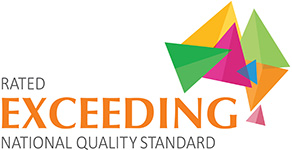Windsor Community Children’s Centre (WCCC), is a community-based Cooperative childcare centre and Kindergarten. It is run by a Board and a Committee of Management made up of parents and educators.
WCCC provides long day care and Kindergarten for children aged six months to five years, on a part-time or full-time basis. WCCC is not zoned; children from all areas are able to attend the Centre when vacancies are available.
WCCC provides a program that is based on fostering children’s interests providing learning that caters to each child’s individual stage of development with emotional and social development being a fundamental part of the program. We are underpinned by the National Early Years Learning Framework, the Victorian Early Years Learning and Development Framework, Early Childhood Australia’s Code of Ethics and United Nation’s Rights of the Child. We also find inspiration and guidance in several pedagogic approaches and philosophies including Reggio Emilia, Anti-Bias and emergent curriculum. We pride ourselves on the partnerships we have with our families where we seek their input into our program and work together through their early childhood journey. To support this, educators provide fortnightly room reflections detailing learning and interests within the different spaces. Throughout their time with us individual learning stories are provided as the children progress through appropriate learning goals.
WCCC children are free to make their own choices. We have informal routines (such as morning and afternoon tea, lunch and sleep/rest times) and the children are given the option of indoor or outdoor play whenever possible. The centre is committed to environmentally sustainable practices. This is seen through our large natural outdoor space, use of natural materials and the community garden which are all integral parts of our place in the community.
The government Child Care Benefit is available for eligible parents and the Centre is registered for Child Care Subsidy. 2024 fees are $175 per day, less any child care subsidy you are entitled to.
For more information, see Info for families.
Statement of commitment to child safety
Windsor Community Children’s Centre:
- has zero tolerance for child abuse
- actively works to listen to and empower children
- has systems to protect children from abuse, and will take all allegations and concerns very seriously and respond to them consistently, in line with the organisation’s policies and procedures
- is committed to providing a safe environment for all children
- is committed to promoting physical, emotional and cultural safely for all children, including Aboriginal children, children from culturally and/or linguistically diverse backgrounds and children with a disability.
History
1977
The Prahran College Union establishes the Prahran College Community Child Care Centre in an attempt to meet some of the childcare needs created by the mature-age students and employees of the college.
1979
The Union forms the Prahran College Community Child Care Cooperative. The Centre is open to children from the local and broader community.
1980 – 1982
The Prahran College Community Child Care Cooperative takes responsibility of the childcare centre from the Prahran College Union. With the formation of Victoria College and Prahran College of TAFE, the Centre changes its name to Prahran Campus Community Child Care Cooperative.
1986
The Centre receives a government grant to move the service to 47 Green Street and to increase numbers from 14 to 20.
1992 – 1996
Prahran College of TAFE amalgamates with Swinburne University of Technology, and Swinburne and the Office of TAFE provide funding for a new purpose-built centre based at 131-133 Union St.
1997
The Centre moves from Green St to the current Union St premises, and changes its name to Swinburne Prahran Community Children’s Centre Cooperative.
2013 – 2019
Swinburne University closes its Prahran campus and the Centre becomes independent from Swinburne, renamed Windsor Community Children’s Centre. The Centre in its present form provides education and care for 54 children per day.

